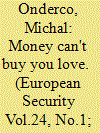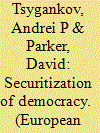|
|
|
Sort Order |
|
|
|
Items / Page
|
|
|
|
|
|
|
| Srl | Item |
| 1 |
ID:
137045


|
|
|
|
|
| Summary/Abstract |
This article examines the performance of the European Union (EU) in the International Atomic Energy Agency (IAEA). Following Barnett and Finnemore, the article argues that the EU as an intergovernmental organization (IO) possesses bureaucratic power based on high technical knowledge and rational–legal authority that it can use to gain influence in the Agency. The EU uses its technical knowledge to be a first-mover in political and technical discussions, and uses its financial support to influence the Agency's technical standards and practices for nuclear safeguards, security, and safety. Nevertheless, the analysis shows that its rational–legal authority as an international organization is limited. Being a regional IO, it does not automatically possess the impartiality and hence legitimacy that ordinarily characterize an international organization. Thus, to further improve its performance in the IAEA, the EU must look beyond internal policy issues and focus on its external legitimacy and standing as well.
|
|
|
|
|
|
|
|
|
|
|
|
|
|
|
|
| 2 |
ID:
137044


|
|
|
|
|
| Summary/Abstract |
In 2003, the European Union (EU) launched its Strategy against the Proliferation of Weapons of Mass Destruction in which it sought the strengthening of an effective multilateral non-proliferation regime, with the Nuclear Non-Proliferation Treaty (NPT) as its cornerstone. Focusing upon the implementation of that strategy 10 years on, this paper considers the EU's navigation of the NPT negotiation environment and the structural conditions at play between the Nuclear and Non-Nuclear Weapon States and the Grand Bargain enshrined between them. It shows that the EU's “multilateralist combat” within the NPT has met with limited success due to the EU's lack of bargaining power – the EU has neither the will nor the capacity to make the bargaining concessions necessary to achieve its goals in this forum. Further challenging claims that the EU may offer a “benchmark” for the NPT community; this paper suggests that the EU is more a mirror of the imbalance of the Grand Bargain than a solution in how to resolve it.
|
|
|
|
|
|
|
|
|
|
|
|
|
|
|
|
| 3 |
ID:
137046


|
|
|
|
|
| Summary/Abstract |
Norm challenge is a continuous feature of international norms. However, the dynamics of such a challenge are still not properly understood. Therefore, this article examines in-depth the key processes involved in a major, but still underexplored challenge in the case of the nuclear non-proliferation regime: the recent accommodation of India in the regime, even though it developed nuclear weapons in violation of the regime's fundamental non-proliferation norm. More specifically, it will focus on how certain states came about to support such a norm challenge. In this regard, the European Union and its member states played a crucial role, as they included both very supportive and very reluctant states that all had the opportunity to block India's accommodation in the regime. In contrast to the traditional focus on persuasion and argumentation in the norm-based literature, this article argues that it was the peculiar interplay of persuasion and argumentation with material incentives, pressure, and bargaining that created the support for norm challenge in the early stages, in particular in the case of the states that remained highly sceptical of the challenge.
|
|
|
|
|
|
|
|
|
|
|
|
|
|
|
|
| 4 |
ID:
137051


|
|
|
|
|
| Summary/Abstract |
A long-held axiom, political leaders are said to favour an action space sufficiently wide to allow them, as a minimum, a face-saving exit. This makes it particularly interesting for us to study those rare cases where political leaders seem to be deliberately reducing their policy options to the point of having merely one line to pursue. The handling by Russian President Vladimir Putin of the early 2014 crisis over Crimea, eventually leading to the annexation by Russia of the Ukrainian Peninsula on 21 March 2014, seems to represent such a rare case. Through the use of state-controlled media, a highly dichotomized framing of the crisis was presented to the Russian audience, essentially leaving Putin with just the one option of acting to “save” the Crimeans from the Ukrainian Government by bringing them into Russia
|
|
|
|
|
|
|
|
|
|
|
|
|
|
|
|
| 5 |
ID:
137050


|
|
|
|
|
| Summary/Abstract |
International sanctions against Iran and Syria have been tightened to unprecedented levels since 2012, particularly in the case of the European Union's (EU's) restrictions on the countries' energy and finance sectors. Marking a departure from the EU's carefully targeted sanctions policies of recent decades, they represent de facto comprehensive measures widely associated with negative humanitarian impacts. This paper analyses semi-structured interviews, official discourse and case studies to explore early reports of negative impacts on the health of ordinary citizens in Iran and Syria and examines associated policy responses, particularly in the EU context. The author outlines why a shift towards broader-based sanctions could be problematic for the EU and outlines constraints currently preventing more efficient risk mitigation. This paper suggests ways that sanctions, representing an increasingly vital, albeit contested, tool of EU foreign and security policy, could be used in a more prudent manner if a worsening humanitarian situation is to be avoided.
|
|
|
|
|
|
|
|
|
|
|
|
|
|
|
|
| 6 |
ID:
137049


|
|
|
|
|
| Summary/Abstract |
This article assesses whether the EU contributes to long-term positive change in societies emerging from violent conflict, helping them ‘mend’ or whether it simply encourages societies to ‘make do’ with the status quo. To do so, the article focuses on two of the principles found in the Treaty, peace and justice for human rights violations. It examines how the EU translates the principles of peace and justice into policy and puts them into practice by analyzing EU engagement in peace mediation, transitional justice, and security sector reform in general and through in-depth examination of EU engagement in the Democratic Republic of Congo. It questions the prevailing discourse that greater inter-institutional coherence would improve EU security provision and considers whether and how the EU prioritizes between peace and justice. The article finds that principles may be translated into policy and put into practice, and practice is often ahead of policy. But this is uneven within as well as across the institutions. Greater coherence between principle, policy, and practice, rather than between institutions, would improve EU security provision and enable prioritization. If the EU settles for making do, it undermines its considerable potential to contribute to long-term solutions to complex conflicts.
|
|
|
|
|
|
|
|
|
|
|
|
|
|
|
|
| 7 |
ID:
137047


|
|
|
|
|
| Summary/Abstract |
The controversy of the Iranian nuclear programme divided the European Union (EU) member states. Whereas some states preferred confrontation, others were in favour of the accommodation. Policy commentators frequently ascribed this difference to diverging economic interests of Europeans, but this link remained underexplored. In this article, the empirical link between the economic interests and positions towards Iran is explored. The analysis rests on the evaluation of both overall and strategic trade flows. The results suggest that while trade played a certain role in the shaping of the policies, the effect of the strength of the alliance with the USA explains a large part of the puzzle. The article thus casts shadow on the established policy narrative of economic interests being the driver of the EU members' Iran policy. In addition, the theoretical implications cast shadow over the applicability of commercial liberalism on instances of confrontation short of war.
|
|
|
|
|
|
|
|
|
|
|
|
|
|
|
|
| 8 |
ID:
137048


|
|
|
|
|
| Summary/Abstract |
This article explores the claims of Russian officials that US assessments of economic and political developments in Russia, particularly those of Freedom House (FH), are excessively critical and often used to justify global dominance. To assess the validity of such claims, three different influences are considered: culture, power, and special interests. The article finds that all three, each with roots in the cold war, play a role in shaping assessments of Russia and help to explain why FH's analysis of Russia is more critical than the analysis of other organizations. The politics of special interests is found to be particularly influential and reflects the interests of US national security policies and priorities. Such priorities are also linked to a politics of memory derived from the cold war, which often influences perceptions of Russia as a threat rather than as a potential partner.
|
|
|
|
|
|
|
|
|
|
|
|
|
|
|
|
|
|
|
|
|